
Ron Sexsmith: “The first person that came along that made me want to be a songwriter was Ray Davies.”
The Canadian ‘songwriter’s songwriter’ started learning hundreds of covers, has a ‘no co-writing’ rule and hasn’t got a mobile phone
Although commercially a somewhat unsung hero, Canadian Ron Sexsmith is a critically acclaimed, multiple Juno Award winning singer-songwriter who is held in high esteem by his peers. The likes of Elvis Costello, Elton John, Paul McCartney, Steve Earle, and Sheryl Crow are among Ron’s famous admirers and many have covered his songs. Rod Stewart, Feist, and Nick Lowe have all recorded versions of the Ron Sexsmith song Secret Heart, and more recently, a version of Whatever It Takes appeared on Michael Bublé’s 2009 album Crazy Love – the song that won Ron a songwriter of the year Juno Award in 2011.
Starting with his 1991 debut long-player Grand Opera Lane, Ron Sexsmith has released 13 studio albums, culminating in Carousel One which arrived earlier in 2015. During the past 24 years, Ron has collaborated with many acts, including Coldplay’s Chris Martin, Beth Rowley, Shonen Knife, Dutch singer-songwriter Marike Jager, drummer Don Kerr, Norwegian singer-songwriter Ane Brun and also performed a duet with Leonard Cohen.
Songwriting caught up with Ron ahead of an intimate acoustic show at London’s Union Chapel, that will see him draw from his enthralling body of work. It was a perfect opportunity to reflect on his prolific and consistent output, and ask him how it’s done…
Read our 2024 interview with Ron Sexsmith
When did you first find yourself compelled to write music?
“When I was really small, I was glued to the radio, but often I didn’t know what they were singing about so I’d make up my own lyrics to the existing melodies. I used to be like that kid from Charlie Brown; Linus, with the blanket, except I had this sock I was always carrying around, and often I’d be in my room, swinging it around and singing to myself. My parents were a bit concerned – they thought I was talking to it, or something! But I think I was sort of making up songs.”
How old were you then?
“Four or five. At the time I didn’t even know I was making up songs, but as I got older I had some really close friends and every week we’d pretend to be something different: one week we’d be detectives and the next week we’d think we were starting a rock band. We didn’t know how to play but I remember starting to write these songs and they were awful! At that point, my friend’s mum worked in a toy store so she’d bring home these drums and guitars for kids and we’d be playing them and singing over the top, but we didn’t know any chords or anything. I really loved to sing, that was my first love, and I never really thought about songwriting. I was a big fan of Elton John when I was nine or 10 years old and I knew that he wrote his own songs, except for the words, but it really didn’t seem like something that I could do. The first person that came along that made me want to be a songwriter was Ray Davies and that was when I was 15 or 16 years old. Because up until then I just thought you needed some sort of training. I didn’t know. Once I got into The Kinks, that’s when I started beginning to learn some chords.”
WITH SONGWRITING, YOU’RE NOT OPERATING OUT OF NOWHERE – EVERYONE’S GOT INFLUENCES
What was different about Ray Davies’ approach to songwriting that made you think you could do it?
“I guess there was something about him and his voice that I could sort of relate to. I mean, I loved the Beatles but I just didn’t feel cool. John Lennon seemed so cool and their music seemed so advanced, but with The Kinks there was something lop-sided about them. Ray Davies warbled a bit, he was a bit flat as a singer, but it all just came together for me, at that point. I remember listening to ‘Golden Hour of The Kinks’ and every song sounded… it was like ‘where have you been all my life!?’ They weren’t really a part of my experience. I think I might’ve heard You Really Got Me as a kid, but I hadn’t heard Days or Autumn Almanac and all those sorts of things, so it was really eye-opening. But, even then, I was trying to write songs at 16 that were sounding like really bad Kinks’ songs from a distance, so even though I was making these attempts I didn’t know I could do it.
“When I got out of high school, I started to play the bars. My older brother got me this gig at a local tavern. But I had to learn so many songs – because you couldn’t play your own – so I think from learning about a hundred songs, because I did it for about five years, it was a real education. So when I finally started to write my first good songs, when I was 21, I had this wealth of information. With songwriting, you’re not operating out of nowhere, everyone’s got influences. So there were all these different stages, but it was really Ray Davies that was the trigger and then I had to go through this thing where I can go from E to G-flat because someone did before. I think really the first song I wrote that I thought was any good was Speaking With The Angel, that I wrote when I was 21 years old, and I haven’t looked back really.”
Can you remember where you were when you got that song?
“Yeah, it would’ve been about March of 1985, when I was living in Quebec. I was a very young father and I think this also played a big role in me becoming a songwriter, because I had so much confusion in my life at this point and it was so stressful – I never thought I was going to be a dad at 21. I was living in a barn (it was literally a barn that had been converted into a house) with this woman, the mother of my kid, and we didn’t really know each other. There’s a whole soap opera story that goes along with that! But there was an old upright piano in this barn. I was trying to figure out chords on the piano and my son was making these baby noises on the ground and I think she had said something like, ‘Oh he’s speaking with the angel’ and it made the light-bulb go on over my head. I remember I wrote it all on that first night on the piano, and then I switched over to the guitar because I was terrible on the piano. That was kind of it, but over the next weeks and months I found myself in a songwriting frenzy – I had so many melodies coming into my head that I finally felt what I’d always read what the songwriter experience was.”

Ron: “I sort of have a ‘no co-writing’ rule for my own records because I just want it be from just one place.”
Speaking With The Angel was on your first release wasn’t it?
“Well, I made a few attempts in the 80s and 90s. I had a cassette called Grand Opera Lane that come out in 1991 and it was on that one. It was actually the song that lead me to getting a publishing deal. But even before that, I had a few other cassettes that I put out. I really wasn’t sure if it was too preachy or something like that, but it did ultimately become the song that got me in the door.”
Over the years since, you’ve become very well regarded as a co-writer. Has your approach changed from being an introspective, solo songwriter to a more collaborative process? Or do you still like to work alone?
“In the beginning I was doing it all by myself, and I still do write by myself. I don’t think the collaborations began until I got a publishing deal and that was mostly because I was encouraged to go to L.A. and write with people. Because initially all I had was a publishing deal and I didn’t know if it would be anything more than that, so often you do it because you’re hoping that maybe you’ll get lucky with the song. It’s sort of a different part of the brain that you use when you co-write, because often times you end up with a song that you wouldn’t have written by yourself, and that can be really good. Beth Rowley and I wrote a really nice one called Forest Fire.
“Other times, it’s not such a pleasant experience. I really like when a few times I’ve written long-distance, where someone will send me a musical idea that I write lyrics to, or vice versa. Because it can be awkward being in a room with someone you don’t know. I sort of have a ‘no co-writing’ rule for my own records because I just want it be from just one place – the thoughts are mine and the melodies are mine. But I keep co-writing whenever the opportunity presents itself just with the idea that I’ll get lucky with one. That One Direction will do one, or something, and I wouldn’t have to worry about money any more!”
SOMETIMES I’VE HAD CO-WRITING EXPERIENCES THAT ARE LIKE PULLING TEETH
In what way do you switch your brain when you co-write, compared to writing for yourself?
“It’s sort of hard to explain, but I wrote a few songs with the legendary Don Black a while ago and I could write with that guy all day long! We had a lot of shared experiences and, even though we’re different ages, he was coming from a place that I understood. With the first song we wrote, we’d only just met and had a coffee or something and he gave me a lyric and I’d written the music in the taxi cab on the way back to my hotel, just in my mind. He wrote the kind of lyrics that you could do that – they had a meter, they made sense. You can do that with someone who knows what they’re doing.
“Sometimes I’ve had co-writing experiences that are like pulling teeth. Either they didn’t want to be there, or you’re writing with someone and they’re looking at their phone all the time. And sometimes you’re writing with someone who’s coming from a completely different place and I learn something – sometimes it’s fun to step out of my own little thing. But when I write by myself, it’s a drawn out process where you’ve get this little idea that you have to shape into something, until you’re ready to show it to people.”
Do you treat each album as a very separate part of your life?
“Yeah because I tend to write in batches and they’re influenced by a certain phase you’re going through, or a change of scene. For example, my drummer bought me a piano one year, for a birthday present, so all of a sudden I found myself writing all these songs at the piano and that became an album. Every album has got its own character, even though you don’t always realise it at first, because you’re in it. But once you’re at the point when you’re in the studio and you’re hearing it, you definitely want every record to have its own personality. It’s going to anyway, just by the nature of where you are in your life and what you’re thinking about. Also it’s going to have its own character just by the different producers and musicians you work with. I’ve done some albums in England and L.A. and Nashville. But I think when you put them all beside each other, there’s definitely a thread there but I think they’re all quite different.”
Do you find it’s getting easier or harder to write as you get older?
“It’s just as hard as it ever was! But it’s sort of as easy too, because I still get these ideas and melodies, and I get all excited. I find the experience is great, in terms of problem solving – things that I used to get really stuck on, I can get through a bit easier. I don’t know if it’s the equipment now, but it’s just hard these days to get a record out because they’re expensive to make and you’ve got to go through all this pulling your hair out for months or weeks writing and then sometimes you put a record out and nobody even notices it. You wonder sometimes, ‘What am I doing?’ But the songs keep coming and I figure that as long as they keep coming I’ll still want to make records.”

Ron Sexsmith: “I don’t even have a phone or anything like that… I just have to commit everything to memory.”
Is writing a daily habit for you, or can you put it down for months at a time and then pick it back up?
“It’s not like a 9-to-5 or anything, but I’m always thinking about something and I’ve got a bunch of ideas now that I’m in the middle of – some are finished and some are still kind of in the works. So when I’m walking around or I’m doing the dishes, I’ll be thinking about it and all of a sudden I’ll get an idea for a second verse, or something for one of them. So it’s a thing that you’re chipping away at, until eventually you notice that they’re finished; they’re done.
“But it’s not a thing I can take time off of, even if I go away on a vacation. Like I had with an album called Long Player Late Bloomer – my wife and I went down to Santa Fe in New Mexico and I had no intention of writing down there, but she rented me a guitar because she thought I’d be bored without it, and I ended up writing almost a whole record there.
“Sometimes you just have to be ready for it, with a pen and a piece of paper nearby. Because I have forgotten things – I might get a great idea when I’m down at the swimming pool and I get home and I’ll have completely forgotten it.”
Do you use any sort of dictaphone or phone to record ideas?
“No, I don’t even have a phone or anything like that. I have a home phone, obviously, but I don’t have a cellphone. So I just have to commit everything to memory.”
WHEN PEOPLE STARTED GETTING ALL THESE SMARTPHONES IT STRESSED ME OUT
Was that a conscious decision to stick with traditional methods and avoid technology?
“I’m just not very technical. I have a laptop and I’ve got GarageBand on my computer, so I’ve got pretty good at making a little demo on there and sending it, if I have to. But I’m just not very good with the gadgets and I’m not much of a phone person, so when people started getting all these smartphones it stressed me out! So I just sort of avoided it until I realised that, ‘Hey, I don’t really need to have one.’”
So do you take a notebook with you everywhere, or do you try and remember everything?
“I do have all these journals that I’m stribbling down in, but sometimes I won’t have one and I’ll have to commit it to memory, and I’m pretty good at that. Esepcially with melodies – I’ll have a melody going around, sometimes for months, without any lyrics, in my head that I’ll keep returning to.”
Do you subscribe to the opinion that if you forget an idea then it wasn’t worth remembering?
“I kind of do, yeah. The other thing that’s happened on occasion is I’ve completely forgotten something, but then a week or so later it comes back, and I always found that interesting. It’s like you’ve misplaced it somewhere in your head, somwehere and ‘here it comes again!’ Then I think that was really meant to be, because it came back. I’ve definitely lost stuff forever and you don’t get too heartbroken about it, but sometimes it’s a little frustrating.”
What’s different about the upcoming solo acoustic show here in the UK?
“The last bunch of shows we did over there were with me and my full band, so that’s a whole different thing for me. When you’re in the band you get a set going that seems to work in a sequence and you just play it because you want it to become this thing that’s like a well-oiled machine. But with a solo show it’s a whole different thing – I can get a little bit more nervous with the solo shows, but it can also be more rewarding, ultimately. And, with a solo show, you have a little more flexibility in terms of what you’re going to play. So the setlist can get a bit hijacked because people will start yelling things – I get requests and I try to accommodate them.”



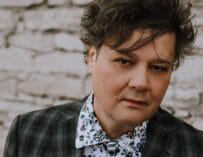
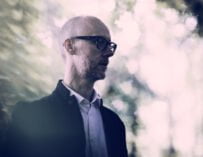
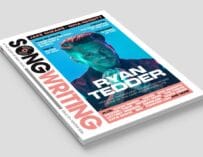


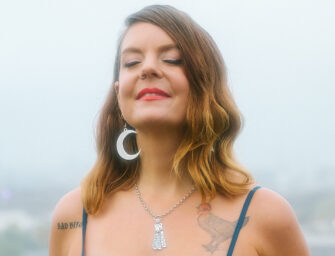

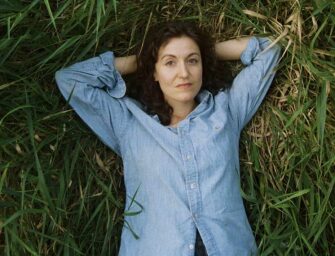






















I’m totally blown away by the similarities in songwriting that I share with Ron Sexsmith. Almost identical. Very cool. That’s encouraging. ????